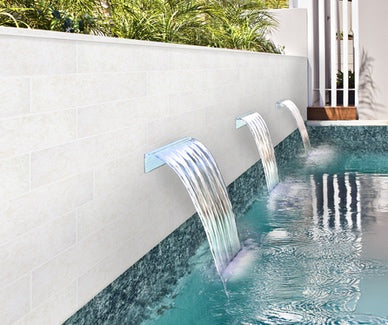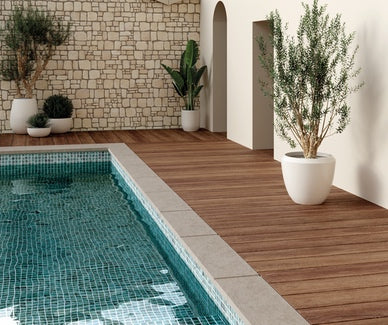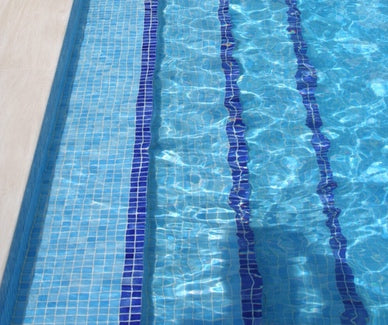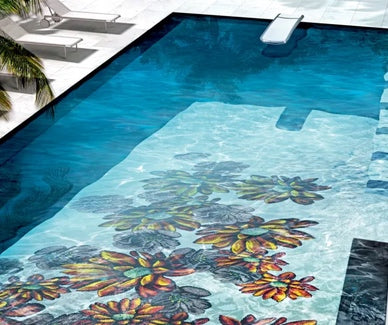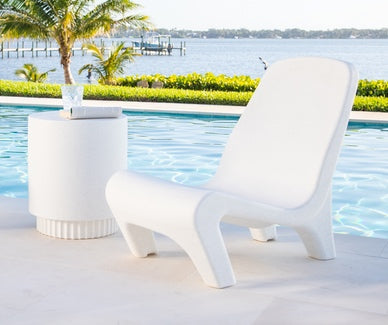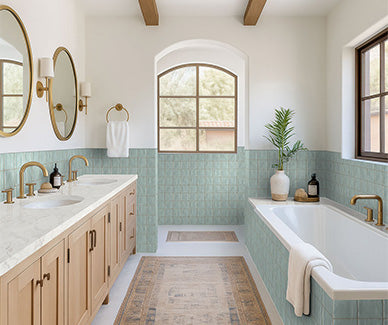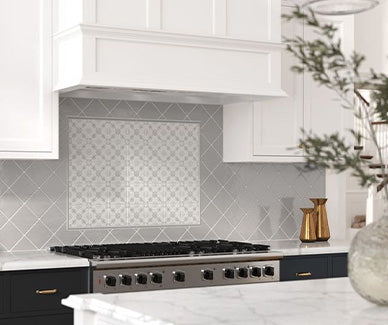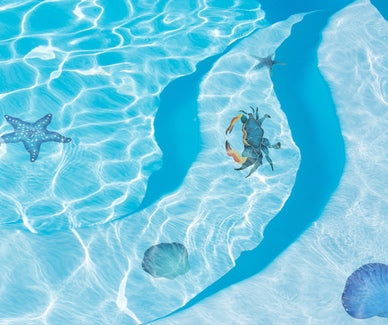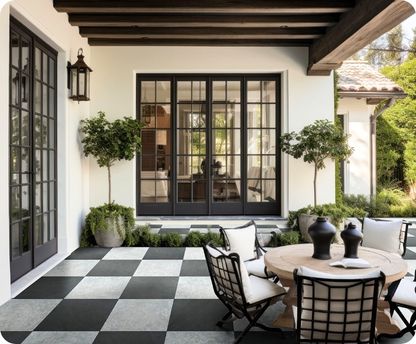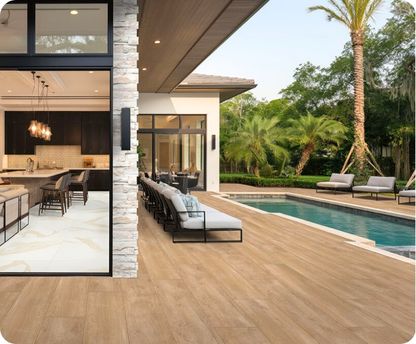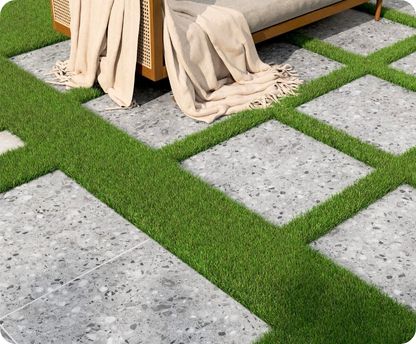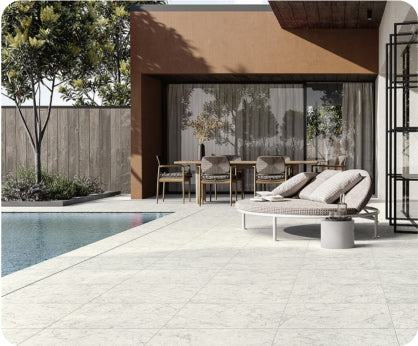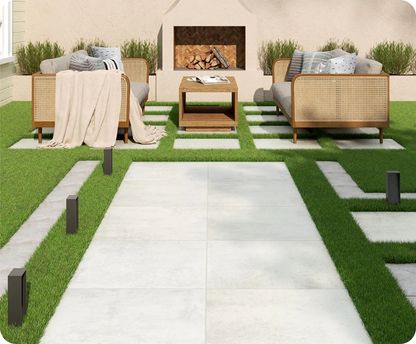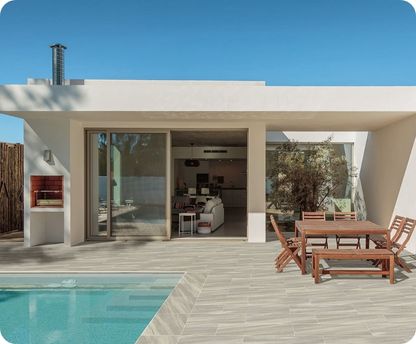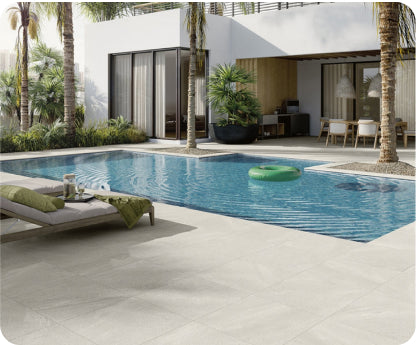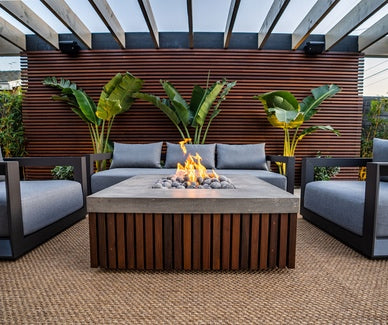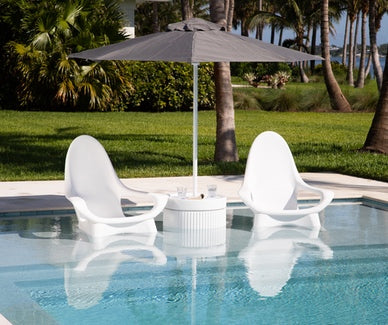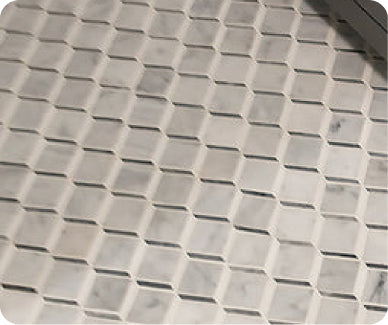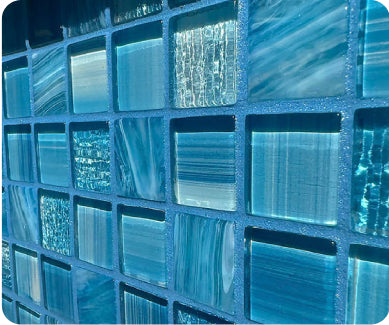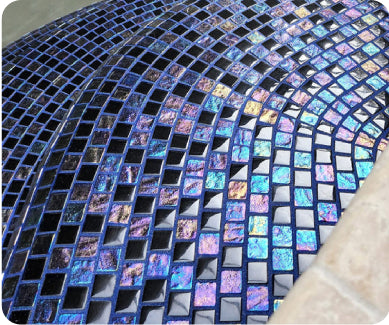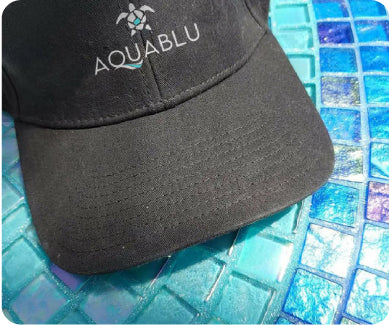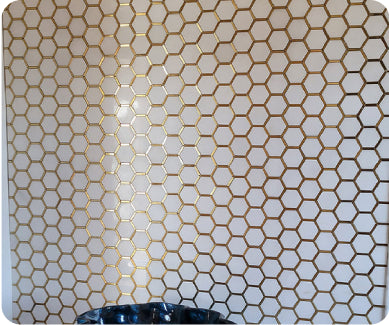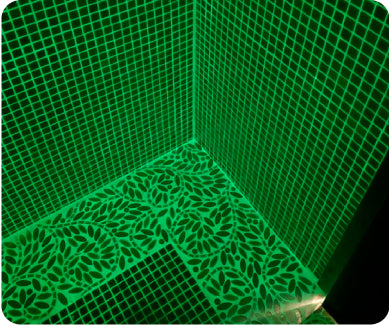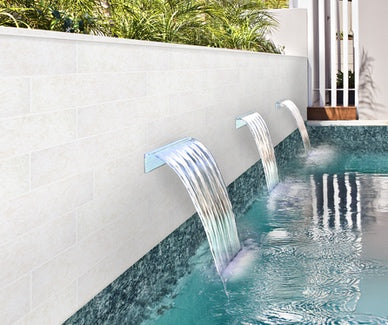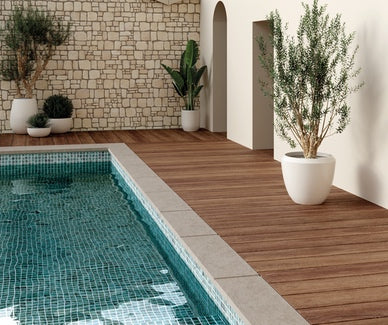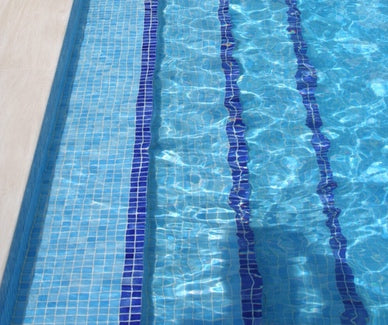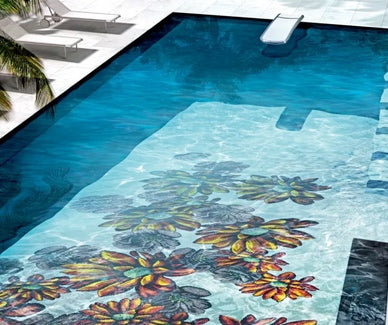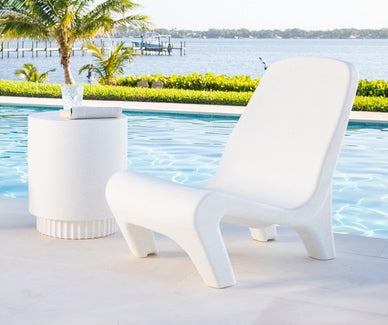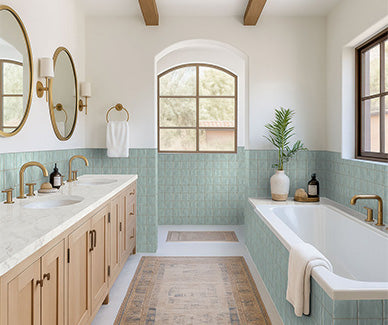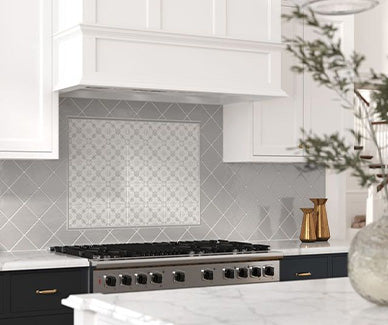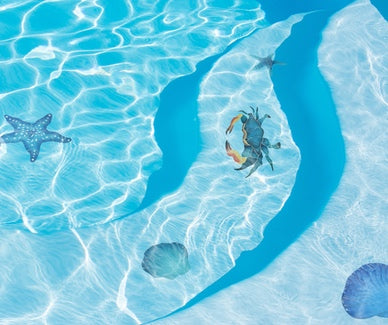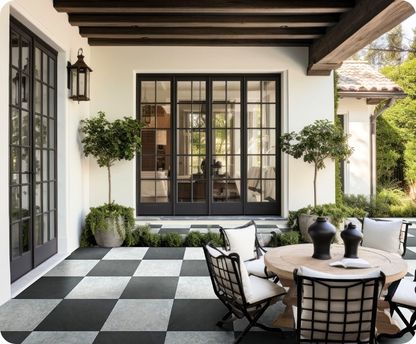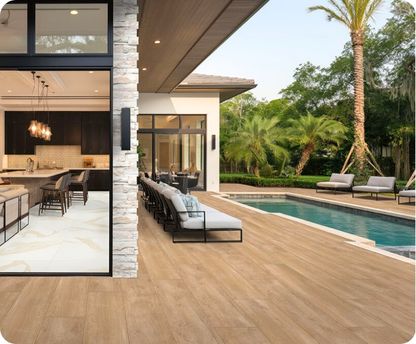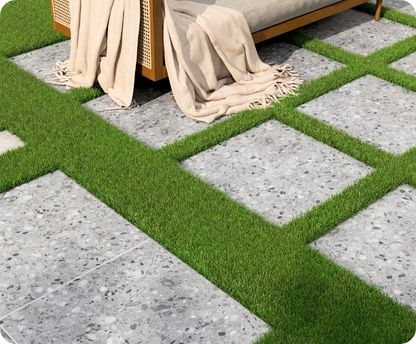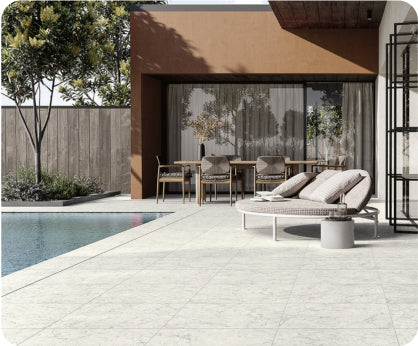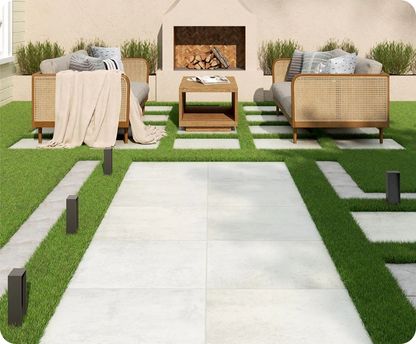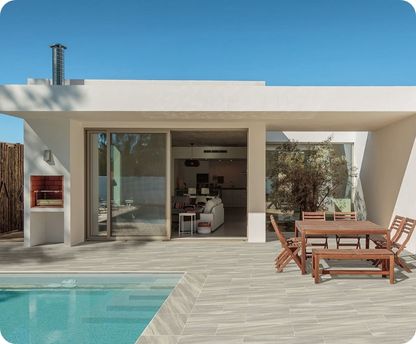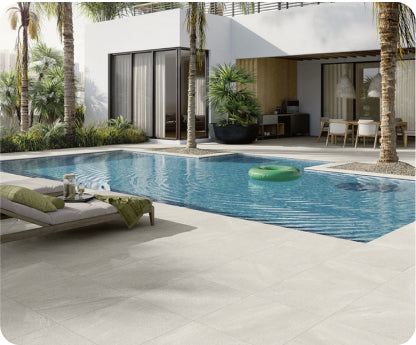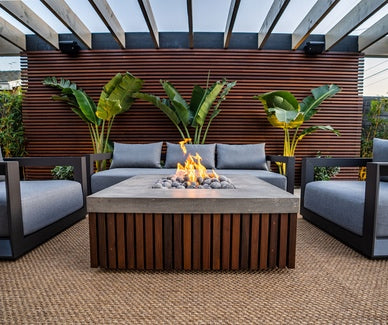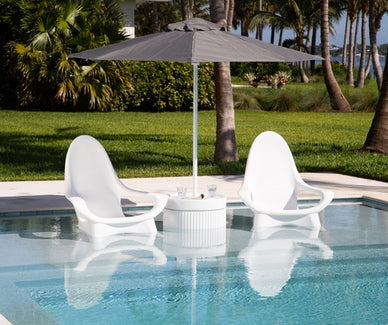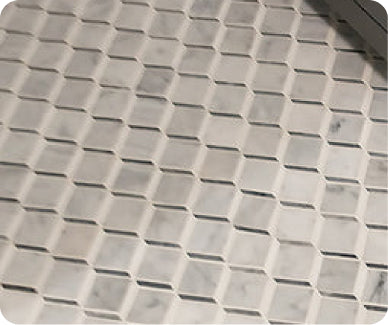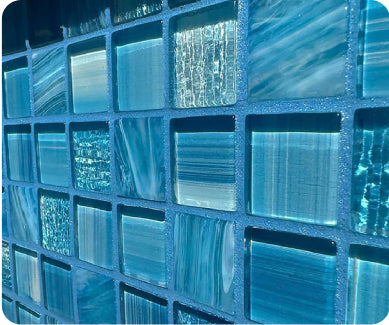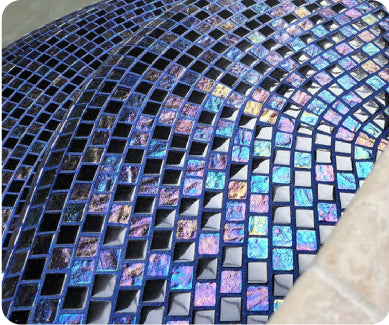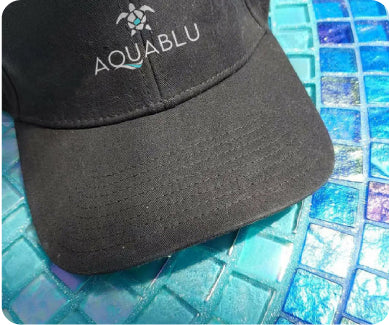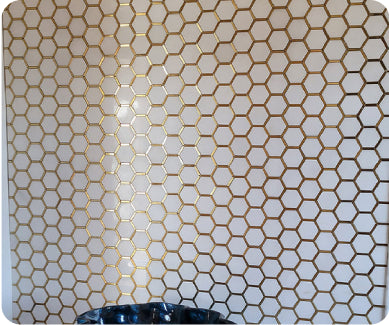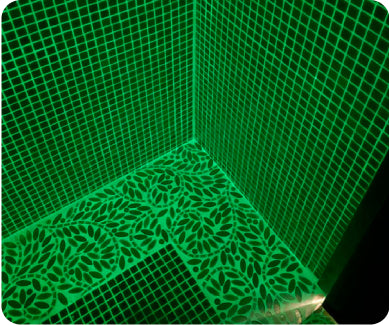Glass Tile vs. Porcelain Tile - Do You Know the Difference?

While porcelain tile and ceramic tile may still be the most popular choice for indoor and outdoor applications, glass tile is rapidly closing in as a design choice for backsplashes, counter tops, interior walls and swimming pools.
But how much do you really know about what separates these attractive tile choices? First off, it’s important to understand the difference between porcelain tile and ceramic tile. These two terms are often used interchangeably – but they are more like cousins than identical twins.
The main difference between a porcelain and ceramic tile is the rate of water they absorb. Porcelain tiles absorb less than 0.5% of water while ceramic and other non-porcelain tiles will absorb more. This makes porcelain tile a better choice for use around water such as for pools, backsplashes and showers.
This difference in absorption is due to the materials used to make porcelain tiles. Porcelain tile is made from clay and other natural materials blended together and fired in a furnace. It’s known for being highly uniform in construction and non-porous.
Generally, porcelain tile comes in the same thicknesses as ceramic tile, but it is heavier overall. It is also offered in more shapes and styles than ceramic tile.
The advantage of ceramic over porcelain tile is that it’s less expensive and easier to cut and shape because it’s softer.
Glass tile on the other hand is a totally different animal. Glass tiles are made through a variety of production methods, however the three of the primary types are: cast glass, fused glass, and sintered. Glass mosaic tiles are commonly pre-mounted in mosaic patterns either on the face of the tile, or on top of a mesh backing. Glass tile’s surging interest in recent years is greatly due to the reflective quality of glass and how it can brighten a pool or dull interior space as well as the ease of maintenance.
Here’s a closer look at some of our best glass and porcelain tiles:
Black Iridescent 1” x 1” Glass Tile
The Black Iridescent 1” x 1” Glass Tile transforms light into a mesmerizing display of color and movement. Each tile shimmers with subtle tones of violet, blue, and silver as sunlight or water ripples across its surface, creating an atmosphere of refined luxury. Ideal for pool interiors, waterlines, or feature walls, this glass tile captures depth and mystery in every angle. Its small format allows for fluid application on curves or corners, while its durable construction ensures long-lasting brilliance in both indoor and outdoor settings. Whether paired with lighter accents for contrast or darker materials for a moody, sophisticated look, these tiles create a timeless aesthetic that’s both modern and dramatic. The iridescent finish adds dimension and visual intrigue, making any pool or spa shimmer like liquid obsidian. For designers and homeowners seeking to evoke elegance with a hint of the unexpected, the Black Iridescent Glass Tile offers endless creative possibilities.
Signature Gunmetal Blue 1” x 1” Glass Tile
Sleek, bold, and effortlessly refined, the Signature Gunmetal Blue 1” x 1” Glass Tile brings an air of contemporary sophistication to any aquatic or architectural space. Its deep blue-gray hue reflects the essence of calm ocean depths, enhanced by the glossy finish that subtly mirrors surrounding light. Whether featured as a pool interior, spa accent, or statement backsplash, this tile adds a layer of understated luxury to your design. Its small format offers flexibility for intricate layouts or smooth transitions across curved surfaces, while its durable, fade-resistant finish ensures beauty that endures through seasons. The balance between metallic undertones and tranquil blue gives this tile a modern edge—perfect for those who appreciate elegance rooted in simplicity. Blending seamlessly with neutral stone, crisp whites, or brushed steel elements, the Gunmetal Blue Glass Tile introduces a sleek sophistication that stands the test of time.
Black 1” x 1” Glossy Glass Tile
Timeless and striking, the Black 1” x 1” Glossy Glass Tile delivers effortless drama to any design. Its sleek, reflective surface creates a polished look that elevates pool interiors, spas, or accent walls with depth and definition. When submerged, the rich black tone deepens into a mirror-like reflection of the water above—elegant, bold, and endlessly captivating. The uniformity of each 1” tile allows for versatile installations across both large expanses and curved features, offering fluid movement and impeccable finish. Beyond aesthetics, this glass tile’s durability and resistance to fading make it a practical choice for outdoor or high-moisture environments. Pair it with metallic accents for a modern feel, or contrast it with white and marble tones for a timeless black-and-white aesthetic. In any setting, this glossy black tile becomes a design statement—powerful in its simplicity, luxurious in its presentation, and enduring in its performance.
Cayman Blue 1.5” x 3” Glass Tile
The Cayman Blue 1.5” x 3” Glass Tile evokes the pristine waters of the Caribbean with its tranquil hues of turquoise and ocean blue. Each piece captures light beautifully, giving your pool or backsplash a gentle, flowing radiance that shifts with every ripple and sunbeam. The elongated rectangular format offers a fresh alternative to traditional mosaics, adding visual movement and a sense of spaciousness. Whether used as a pool waterline, spa surround, or interior accent, this tile introduces a natural serenity reminiscent of tropical lagoons. Beyond its beauty, the Cayman Blue Glass Tile is engineered for strength and long-term resilience, maintaining its vivid tones even after years of exposure to sun and water. Perfect for coastal-inspired spaces or modern retreats, this tile brings calm, clarity, and undeniable charm to every installation—a seamless fusion of artistry and aquatic tranquility.
Venus White 1” x 1” Glass Tile
Radiant and refined, the Venus White 1” x 1” Glass Tile embodies the purity and light of celestial beauty. Its luminous white tones create a bright, airy atmosphere ideal for transforming pools, spas, or interior walls into serene sanctuaries. When placed underwater, the tile reflects light in soft, iridescent waves, lending a sense of spaciousness and calm. The compact size allows for graceful movement around curves and edges, ensuring a seamless finish throughout your design. Its subtle reflective quality enhances natural light, making it a favorite for spaces that seek to balance sophistication with tranquility. The Venus White Glass Tile pairs beautifully with blues, silvers, and natural stone, allowing endless design versatility. Elegant yet durable, it’s a timeless choice that harmonizes effortlessly with any aesthetic—bringing clarity, brightness, and an ethereal touch to any environment.
Turchese Glossy 2” x 6” Porcelain Tile
Vibrant and full of life, the Turchese Glossy 2” x 6” Porcelain Tile infuses any setting with Mediterranean charm. Its rich turquoise hue captures the essence of seaside living—bright, fresh, and uplifting. Perfect for kitchen backsplashes, shower walls, or pool waterlines, this tile combines artisan-inspired beauty with the strength of modern porcelain. The elongated shape brings elegance and rhythm to the surface, creating a dynamic visual flow that’s both structured and organic. Its glossy finish enhances light reflection, adding brilliance to every angle. Beyond aesthetics, porcelain offers superior durability, water resistance, and low maintenance—ideal for both residential and commercial applications. The Turchese Glossy Tile is a celebration of color and craftsmanship, offering a timeless way to refresh your space with a touch of coastal sophistication.
Agadir Agua 2.8” x 11” Porcelain Tile
The Agadir Agua 2.8” x 11” Porcelain Tile captures the artistry of handcrafted design in a contemporary form. With gentle variations in tone and texture, each tile embodies the relaxed beauty of Mediterranean ceramics. The soft aqua color evokes the soothing hues of shallow coastal waters—perfect for creating spa-inspired bathrooms, bright kitchens, or poolside retreats. The elongated format adds elegance and movement, ideal for herringbone or vertical stacked installations. Crafted from premium porcelain, the Agadir Agua Tile offers exceptional durability, resisting moisture, fading, and wear even in outdoor conditions. Its glazed surface provides a gentle sheen that enhances depth without overpowering the eye. Whether paired with whites for a refreshing palette or natural wood tones for warmth, this tile brings balance, serenity, and timeless beauty to every environment.
Agadir Agua 5/8” x 5/8” Porcelain Tile
The Agadir Agua 5/8” x 5/8” Porcelain Tile transforms small-scale design into an art form. Its miniature mosaic format and soothing aqua tones create a calming, luminous effect that works beautifully in pools, spas, and water features. Each piece reflects the tranquil spirit of the Mediterranean, blending artisanal charm with the endurance of porcelain. The glossy surface enhances its soft blue-green hue, catching and scattering light for a liquid-like shimmer. Perfect for curved surfaces or intricate designs, the small size allows unparalleled flexibility while maintaining structural strength. This tile’s resistance to fading and water absorption makes it ideal for both indoor and outdoor applications. Whether used as a pool interior, shower wall, or decorative accent, the Agadir Agua Mosaic adds texture, color, and a sense of peace—an inviting reminder of sunlit waters and effortless sophistication.
Flora Vera 6” x 6” Porcelain Tile
The Flora Vera 6” x 6” Porcelain Tile brings artistry and nature together in a tile that feels both timeless and contemporary. Its delicate botanical-inspired patterns evoke hand-painted craftsmanship, while the soft hues of green and cream introduce warmth and organic charm. Perfect for kitchen backsplashes, bathroom walls, or pool waterlines, this tile infuses any space with personality and artistry. The matte finish gives it a refined, tactile quality that complements natural materials like wood, marble, or stone. Made from durable porcelain, it withstands the elements beautifully—resisting fading, moisture, and daily wear. Whether used as a full-surface installation or as a decorative accent, Flora Vera transforms your space into a curated work of art. For those who love design with a story, this tile offers the perfect balance of whimsy, craftsmanship, and quiet elegance.
Kit Kat Water 4.5” x 9.1” Porcelain Tile
Graceful and refined, the Kit Kat Water 4.5” x 9.1” Porcelain Tile captures the essence of tranquil movement. Its elongated vertical format and serene blue tone create an airy, spa-like feel ideal for bathrooms, pool areas, or kitchen backsplashes. The glossy finish amplifies light and depth, while the slim “kit kat” shape adds architectural rhythm and sophistication. Whether arranged vertically for height or horizontally for flow, this tile brings structure and serenity to any setting. Crafted from high-quality porcelain, it offers durability and versatility for both interior and exterior applications. Inspired by the soothing rhythm of water, the Kit Kat Water Tile transforms ordinary spaces into peaceful sanctuaries—where design and nature coexist in perfect balance
Glass Tile vs. Porcelain Tile: Appearance
Aesthetically, glass tile wins this one. Porcelain tile is no slouch in the looks department either. Made from high-quality components, porcelain tiles have the ability to transform your space into something you are truly proud of. However, porcelain (like ceramic) is opaque, which means all its color is on the surface.
Many glass mosaic tile products are translucent, allowing light to penetrate the entire tile or reflect off the tile surface. The translucence of glass gives the tile visual depth, and it gives the overall tile color a beautiful watery shine or glow. For those not looking for a translucent glass tile, you're in luck - there are also many options of opaque glass mosaic tiles to choose from as well. Opaque glass tiles are created by heating and pressing colored glass powder into sheets, which gives the tile a through-color effect.
Both glass and porcelain tile are now available in a vast array of patterns, colors and sizes. For those looking for something with a rainbow-like appearance, consider glass iridescent tile for your project.
Durability of Glass Tile vs. Porcelain Tile
One of the most important qualities of porcelain tile is its durability and resistance to wear. That’s because porcelain has fewer air pockets. It’s a denser material and more uniform in construction and tends to be harder and thicker overall than most other tile varieties.
Porcelain tile floors, for example, are known to last for years, and they are a top choice for commercial use or in rental properties because of just how durable they are over time. If you want flooring that will hold up to pets well and continue looking good for years, that’s one of the biggest benefits that you’ll enjoy. Porcelain is scratch resistant and less prone to breaking. In the swimming pool world, 6" x 6" porcelain waterline pool tiles have been the industry standard for decades.
Glass tile may be susceptible to chips and scratches over time. But a lot of this depends on the quality and thickness of the glass, as well as where it is installed.
Glass can also be slippery in some applications. That’s why some people who install glass floors use a matte finish tile or slip resistant glass tile for more traction. In addition, utilizing small glass tiles is a good option for floors as the larger number of grout joints will increase the overall coefficient of friction of the surface. When installed correctly, glass tile will undoubtedly withstand the test of time.
Glass Tile vs. Porcelain Tile Installation
Both porcelain and glass are typically labor-intensive because of the hardness of porcelain and splintering possibility of glass. Of the two, glass has a more complex installation process so it is recommended that you hire a professional, which may be an extra cost for you. Keep in mind the mounting type of the mosaic tile product you choose as some tile installers either prefer to work exclusively with face-mounted or mesh-mounted tile.
The experts recommend four tools for cutting glass tile:
- A wet saw
- A manual scoring wheel
- A bar cutter
- Wheeled mosaic nippers
Glass Tile vs. Porcelain Tile Maintenance
Both glass and porcelain tile are easy to maintain and have a long life span.
Porcelain tile doesn’t harbor bacteria like more porous material does, and it’s very simple to wipe off and keep clean over time. The tile stays cleaner than traditional ceramic tile and doesn’t suffer from staining as easily. Home owners will love how easy it is to keep porcelain tile looking good.
Glass tile is impervious to liquids and resistant to staining and discoloration, which means cleaning generally only requires a simple wipe down. If you dislike mold with a passion then this is a great choice for your bathroom or swimming pool. But be careful! Although glass may not develop mold, the grout may. Smart shoppers should refrain from using cheap cement-based tile grout and opt for a more waterproof, stain-resistant epoxy tile grout. Using glass mosaic tile as a swimming pool finish with epoxy grout is a "forever" solution when compared with plaster or gunite, providing customers with the longest lasting finish and easiest maintenance.
Glass Tile vs. Porcelain Tile Cost
Glass is generally more expensive than porcelain, but it’s difficult to get a handle on installation costs. These vary dramatically from ZIP code to ZIP code. That said, expect to pay an average installation cost of $10 to $30 per square foot. Of course price will also be highly dependent on volume, so be sure to get a quote from several installers before making any commitments.
On average, porcelain pool tiles start as low as $4 per square foot while glass starts at $6 - $8 per square foot. Premium porcelain or glass tile mosaics can be anywhere in the $20 - $30 range.
For pool applications, the recent trend of glass tile pools is becoming more and more affordable, however if glass is over your budget, you may want to consider using glass mosaic tile for your pool waterline instead. In a kitchen or shower, you can use glass tile as an accent rather than covering large surface areas. Using glass as an accent will also help colorful mosaic blends from overwhelming the room.
-------
Want to know more about glass vs. porcelain tile? Or maybe there’s something else on your mind. Talk to one of our experts. You can call us at (800) 971-1442 or fill out our contact form. You can visit our website at https://www.aquablumosaics.com/.

